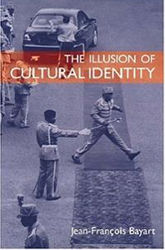“…there are few contemporary matters that do not involve the problem of the illusion of cultural identity.” (Jean-Francois Bayart)
Culture on the Edge is a scholarly working group centered at the University of Alabama and begun in the Spring of 2012 (with this blog dating to 2013). Its aim is to use social theory to offer more nuanced understandings of how those things that we commonly call “identities” are manufactured, managed, and continually reproduced. This blog and its supporting sites do more than merely publicize the group’s findings; they comprise, instead, a public site where the group carries out its collaborative work—both through scholarly blog posts as well as through conversations sparked in the various comments sections, where you are invited to participate, as well.
Under Chapter 1, you will find our older blog posts, form the first phase of the initiative (2013-2016), including those previously classified as Claims, Cites, and Nota Bene, discussing everything under the sun, from the latest political news to chewing gum. It’s a treasure trove of identity formation analysis.
Under Chapter 2, you will find posts from January 2017-on, forming our second phase (instituting a peer review guest blog). These peer reviewed posts explore new angles on identity construction, including posts from contributing scholars along with the Edge collaborative group that comprised Chapter 1. Leslie Dorrough Smith and Steven Ramey are the co-editors of the second chapter of the blog.
Under Chapter 3, we include all current posts, written by our expanded group of core members (number 16).
Under Contributors, you will learn more about the members of this collaborative – including the founding members (Chapter 1), as well as those appearing in the peer reviewed guest blog (Chapter 2) and those added to the core group (Chapter 3).
Under Further Reading, you will find information about the two book series that the group publishes with Equinox, and how you can propose a volume to the Culture on the Edge.
Culture on the Edge therefore tackles the contradiction between the historically situated, always-changing nature of identity and the nagging presumption of a static and ahistorical origin against which cultural change is thought to be measured. Consider, for example, the widely used scholarly notion of syncretism, a term often defined to mean a blending or merging of otherwise distinct cultural habits. If “culture” is a word that scholars use to name elements of the complex web of diverse human practices that, at a given moment, catch our attention, then “culture” is nothing more than a discrete subset that we thereby isolate from its wider environment for our scholarly purposes. If this is the case, then we have not really said anything remarkable about a particular set of historically determined human practices when we label it syncretistic, for the supposed sources from which it derives are themselves always and already complexly blended and ambiguous.

Rather than being a merely intellectual exercise, focusing on the construction of such narratives allows us to see the often unspoken politics that underscore some of our most common and naturalized claims. Following the work of Jean-Francois Bayart,, in particular his 1996 book, The Illusion of Cultural Identity (English translation: 2005; read a review here [PDF]), we propose moving from studying identity as the presupposition of an inner sentiment that is somehow externalized in the public domain (i.e., the assumption that drives such common phrases as “express yourself”) towards a method that, instead, analyzes discrete strategies of identification and the situationally-specific techniques that create a sense of authenticity, autonomy, and/or primordiality. For instance, it is not uncommon to hear in the media that certain religious groups that use violence to promote their ideologies are “counterfeit” versions of the “real” religion. Rather than see “realness” as an irreducible essence or thing, our interest lies in asking how claims about “realness” work to legitimize certain forms of religion over others. In this way, what is said to be an identity (a noun, a static item) is always the result of identity claims and counter claims (verbs, active processes). This is why such linguistic devices as “express yourself” may now be understood not as benign language but as a series of techniques used to recreate the impression that personhood — that “self” — is a stable interior attribute manifested outwardly.
Read an excerpt from the book here.
The group’s research will appear in one of two book series: Culture on the Edge: Studies in Identity Formation (edited by Steven Ramey) or Working With Culture on the Edge (edited by Vaia Touna), both with Equinox Press. Other proposals for books that might appear in the first of these two series are encouraged; see Book Series to learn more about submission/prospectus requirements.
Listen to a podcast by the group here.

(Our sincere thanks to University of Alabama’s
The College of Arts and Sciences’ etech office
for assisting with setting up this blog.)
